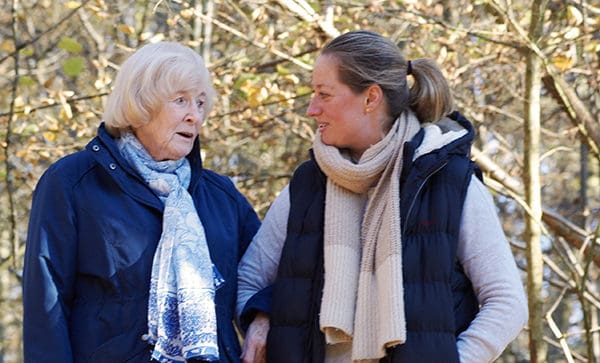According to figures compiled by the Alzheimer’s Society, there are currently around 850,000 people in the UK who are living with dementia, and this figure is expected to rise to around 1.6 million diagnosed with dementia by the year 2040.
One of the main reasons for this startling rise is that as health care continues to improve, we will live longer. Whatever the reasons are, it is understandable that dementia has become one of the most frightening words in the English language.
TABLE OF CONTENTS:
First steps after a dementia diagnosis
Legal and financial considerations
First steps after a dementia diagnosis
A formal diagnosis of dementia can come as a shock to the patient and their family, even though there may have been warning signs for some time. In some people, dementia can appear and progress rapidly, while in others, it can develop slowly and gradually.
Either way, it is difficult knowing what to do, how to get care in place where necessary, what support is available and, more importantly, what does the future hold. You will need to sit down with the person who has received the diagnosis and make plans not only for their future care but also for the management of their affairs should they become incapacitated. Consider arranging a Lasting Power of Attorney (LPA) to enable a trusted family member to look after finances and fill in an Advanced Care Plan. It is essential to respect the wishes of the person who has been diagnosed with dementia so they can be confident in the future.
If they are still employed, you should speak to their employer and colleagues to arrange support and possible adaptations to working hours or practises.
Speak to their GP or any other health professionals involved in the patient’s long-term care. They may be able to direct you towards any local authority support available for people who have been diagnosed with dementia. You can also contact organisations such as Dementia UK or the Alzheimer’s Society for initial advice and support.
Accept the changes
When someone has been diagnosed with dementia, that will change the way you see that person, and it will affect the way they see themselves. The fear factor may cause them to want to stop doing everyday things like driving or shopping; it may also make family members over-protective of them.
There will be a significant role change as, over time, the diagnosed person may become completely dependent on the family member caring for them. This can lead to resentment and arguments over how much care, if any, is needed. One solution could be to consider professional care at home to take the pressure away from family so that they can more easily accept the changes that dementia places on family dynamics.
Dealing with complex emotions
A diagnosis of dementia isn’t solely a medical event; it can be an emotionally charged one, too, for the person diagnosed and their family. Fear, confusion, anger, shock and disbelief are all normal emotions, and it’s important to acknowledge this. Take time to come to terms with the diagnosis, and seek support from family members, support groups and friends when you need it.
You may even find it helpful to seek help from a therapist. With a therapist, you’ll be given a safe space to express your emotions, no matter what they are, and they could provide you with good coping strategies that will help you not only feel better yourself, but will help you care for your loved one better.
Develop coping strategies
For a family member who decides to take on the job of coping with someone with dementia, it’s vital to develop ways of making things easier.
- Accept help when it’s offered.
- Develop routines and reminder strategies for when visitors arrive or when the patient starts to forget things.
- Join a local or online support group to access help or just an understanding ear.
- Encourage your dementia patient to continue with their social networks and interests as much as possible.
Practical caregiving tips
As the disease progresses, you may find that your loved one’s day-to-day routines may need adjusting. It’s important not to panic, as simple changes can make a huge difference to the well-being of yourself and the person living with dementia. It’s good to learn to communicate clearly and patiently. Use short sentences and give visual cues when you feel they might be helpful.
In addition to this, it’s a good idea to break down any tasks into small, manageable chunks. Keep a predictable and calm environment, and don’t make big changes to familiar objects and routines without some lead-up. It’s also wise to be proactive when it comes to hazards at home. For example, you might want to move medication out of reach to avoid overdoses due to the person forgetting they’ve taken their medicine. Plus, you might want to assess the trip hazards within their home.
Legal and financial considerations
There are also practical considerations when it comes to legalities and financials. It might be worth considering establishing a lasting power-of-attorney (LPA), which will allow a trusted person to make important decisions about finances and healthcare when it is needed. It’s a good idea to address this early on while the person still has capacity. That way, you can be sure that their needs are at the forefront of any strategy. It may also be worth drafting a financial or legal advisor to give you the bigger picture of any existing rights or responsibilities. This can help you draft a workable support and financial plan for the future.
Technology and extra help
A range of technological advancements can now help people living with dementia remain independent for longer. GPS trackers, for example, are a good idea for those who may decide to wander, whilst medication apps can serve as a useful reminder of whether medication has been taken.
Smart devices may be helpful to in ensuring a comfortable home atmosphere. It may also be worth looking into the different types of care available, whether in the immediate term or later. It may be possible for your loved one to remain in their own home for longer, obtain live-in care, take the pressure off family members, and allow for a calm, peaceful and comfortable routine so that your loved one can live better with dementia






